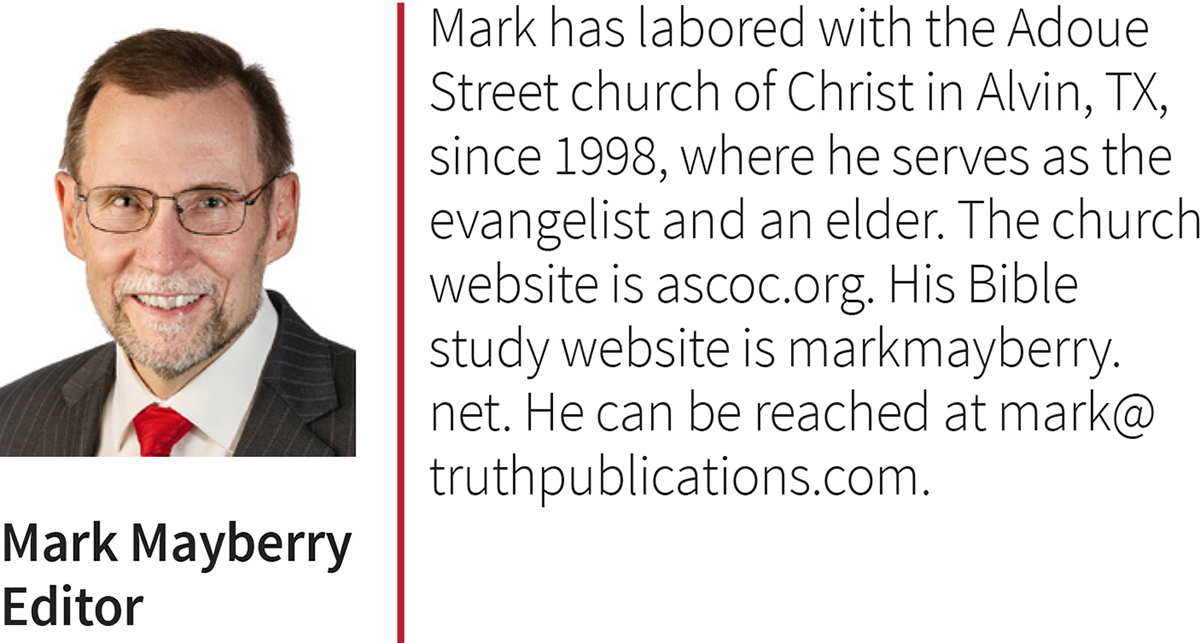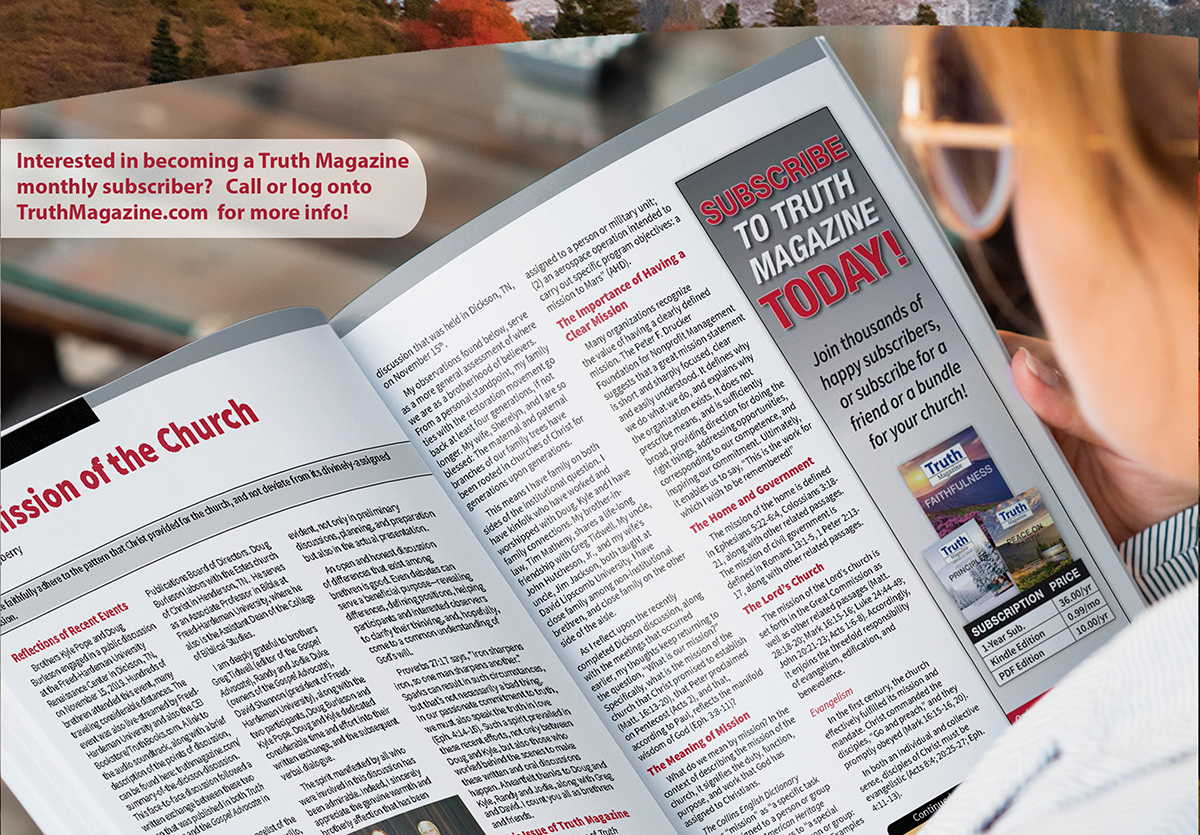
by Mark Mayberry
Synopsis: God expects full obedience. While extenuating circumstances may occasionally hinder us, we must not use such exceptions to excuse apathy or neglect.
We should strive to obey God’s will. Occasionally we are hindered by extenuating circumstances, conflicting obligations, or the inability to participate in an assigned activity because of personal illness or some other limiting set of circumstances. God expects us to render full obedience. Under certain conditions, there might be legitimate exceptions. However, we must not exploit such allowance to invalidate the rule. The real question is, “Do the extenuating circumstances offer a legitimate defense for someone’s failure to fulfill an obligation, or do so in a timely manner, or is the individual merely seeking to cover up negligence or wrong-doing?”
Merriam-Webster defines “expectation” as “(1) the act or state of expecting: anticipation.” What does it mean to expect something? Again, it means “to anticipate or look forward to the coming or occurrence of something. . . to consider something reasonable, due, or necessary. . . to consider oneself bound in duty or obligated in some regard.”
The Concise Oxford English Dictionary defines the noun “exception” as “a person or thing that is excepted or that does not follow a rule.”
Merriam-Webster says that an “excuse” is “something offered as justification or as grounds for being excused,” i.e., to be granted exemption or release from some duty.
Note the two distinct definitions for “excuse” provided by the Concise Oxford English Dictionary: “(1) a defense or justification of a fault or offense; (2) something said to conceal the real reason for an action.”
Wikidiff.com allows users to ask, “What’s the difference between one thing and another?” Note their distinction between an excuse and legitimate justification: “As nouns, the difference between excuse and justification is that excuse is an explanation designed to avoid or alleviate guilt or negative judgment while justification is a reason, explanation, or excuse which provides convincing, morally acceptable support for behavior or for a belief or occurrence.”
The Law of Moses contained many divine commandments, but sometimes extenuating circumstances made it impossible for an Israelite to fulfill such demands. In such cases, allowances were made.
The Mosaic law required regular faithful observance of the Sabbath under penalty of death (Exod. 20:8-11; 31:14-16). However, the Jews recognized that there were exceptions, such as the priests who served in the tabernacle/temple on the Sabbath and a farmer who tended to the needs of his flock. As Lord of the Sabbath, Jesus Christ defended the innocent actions of His disciples and His own benevolent actions in healing (Matt. 12:1-13, esp. vv. 11-12; Luke 14:1-6, esp. v. 5; cf. also Luke 13:10-17). Even folks who are biblically illiterate have heard of “the ox in the ditch.” For those who exploit this unfortunate animal as an easy excuse for their failings, the following quote, attributed to Billy Graham, is worthy of consideration: “Jesus Christ, the Lord of the Sabbath, spoke about the ox in the ditch on the Sabbath. But if your ox gets in the ditch every Sabbath, you should either get rid of the ox or fill up the ditch.”
The Passover and the associated Feast of Unleavened Bread were counted among the three annual Jewish feast days (Exod. 23:14-17; Deut. 16:16-17; etc.). Allowances were made for one who became unclean through contact with a corpse or one who was traveling on a distant journey. Such individuals could observe on the 14th day of the second month (Num. 9:9-14). Unqualified excuses, however, provided no defense against punishment (Num. 9:13).
The Lord God prohibited the Jewish people from sacrificing in cultic places associated with Canaanite worship; instead, they were instructed to seek the Lord at the location He chose from among all the tribes (Deut. 12:1-6, 13-14). During the years of Assyrian and Babylonian captivity, many Jews were unable to worship in the central sanctuary as God had directed. Nebuchadnezzar destroyed the Jerusalem temple in 586/587 BC, demolishing Israel’s designated house of worship, causing sacrifice to cease.
Those who survived the slaughter were deported to distant lands and served as slaves to foreign masters who spoke in a strange tongue. Temple worship became a mere memory (Ps. 137:1-6). Yet, God still had a purpose for His people: “For I know the plans that I have for you,” declares the Lord, “plans for welfare and not for calamity to give you a future and a hope” (Jer. 29:11). Ezekiel ministered to the exiles in Mesopotamia (Ezek. 1:1-3). Spiritual heroes like Daniel and Esther served God to the best of their ability, even though they could not regularly worship in Jerusalem. Daniel and his companions would not eat of the king’s delicacies; Shadrach, Meshach, and Abed-nego refused to bow before the great image that Nebuchadnezzar had erected on the plain of Dura. Despite the related dangers, Daniel opened his windows and prayed toward Jerusalem three times a day (Dan. 1:8; 3:16-18; 6:10).
The New Testament designates five acts of Christian worship: praise offered in song, prayers offered to the Father, proclamation of the gospel message, regular observance of the Lord’s Supper, and giving back a portion of our material blessings.
Someone might say, “I cannot perform this duty because. . . I was sick. . . (or) I was helping a sick relative. . . (or) I was traveling. . . (or) I was working, etc.” There are extenuating circumstances that may excuse us from assembling with the saints; yet, we must not allow legitimate exceptions to become illegitimate excuses. In the Parable of the Dinner, Jesus noted the sad excuses offered by many who had been invited to a large dinner (Luke 14:16-24). Clearly, He was speaking of those who rejected the preaching of John and His own ministry. The lesson is obvious: Christ has prepared a spiritual feast and invites all to take part. Excuses are a form of self-condemnation: “I tell you, none of those men who were invited shall taste of my dinner” (Luke 14:24).
Do we make excuses for our failure to worship? Do we attempt to explain away our apathy? Some defend their failure on lack of knowledge or acquired ability:
Someone might say, “I don’t know how to sing. . .” Well, you can learn, can’t you? Can you listen and follow along? You can do your best, knowing that God primarily focuses upon the heart.
Someone might say, “I don’t know how to pray. . .” Jesus taught the disciples to pray, and you also can learn the principles of acceptable prayer.
Someone might say, “I don’t know enough to preach the gospel or proclaim the apostolic message. . .” You can study, can’t you? You can tell others how God has blessed you, can you not? Can you not share (in some capacity) the simple truths that you understood when you obeyed? Frequently, those whom Jesus healed told others of the blessings they received, even when He said, “See that you say nothing to anyone”(Mark 1:40-45).
Someone might say, “I cannot assemble with the saints and observe the Lord’s supper because I am caring for a sick relative.” Well, thank you for your service, but is there someone with whom you can share the burden so you could still attend on Sunday evening?
Someone might say, “I am unable to assemble with the saints and observe the Lord’s supper because I am scheduled to work on Sunday.” Again, thank you for providing for the physical needs of your family, but can you ask the boss to adjust your schedule so you can be present at one of the Sunday assemblies?
Someone might say, “I cannot assemble because I am traveling.” Travel makes things difficult, but in most circumstances, “Where there is a will, there is a way!” In my sixty plus years of living, I don’t recall a time when we did not figure out a way of worshiping with the saints on the Lord’s day, even when we were traveling. When I was a child, Mom made sure we regularly attended services on Sunday and on Wednesday. In the forty-plus years that Sherelyn and I have been married, we have occasionally needed to travel on Sunday, but we always scheduled our trips around times of assembly and worship (even when the trip was planned on short-notice because of an emergency or death in the family).
Someone might say, “I cannot give because I am poor. . .” Unlike personal income taxes, the gospel does not limit this command to the rich, nor is it connected with our income. In both the Old and New Testaments, giving is proportional. The law required tithing, while the gospel specifies no percentage. Christian giving should be proportional (i.e., as we have prospered) and generous (freely, you have received, freely give).
Be honest and responsible. Show character and integrity. Strive to the best of your ability to fulfill God’s expectations. Reread the blessings that were pronounced at Mt. Gerizim: “Now it shall be, if you diligently obey the Lord your God, being careful to do all His commandments which I command you today, the Lord your God will set you high above all the nations of the earth. All these blessings will come upon you and overtake you if you obey the Lord your God. . .” (Deut. 28:1-2).
In Sacred Scripture, faith and obedience are so intertwined as to be synonymous: Jesus said, “He who believes in the Son has eternal life; but he who does not obey the Son will not see life, but the wrath of God abides on him” (John 3:36). Pridefully rebellious men who do not obey the truth, but pursue unrighteousness, will face God’s wrath and indignation on the last day (Rom. 2:8-9).


